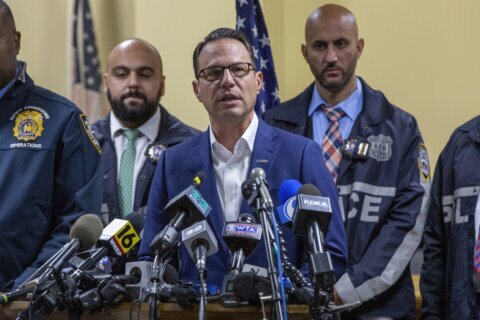PHOENIX (AP) — Members of an Arizona tribe urged a federal judge Tuesday to extend a temporary ban on exploratory drilling for a lithium project near lands they have used for religious and cultural ceremonies for centuries.
An executive for the Australian mining company that is trying to determine whether there is enough lithium to justify a commercial operation to help expedite production of renewable energy resources testified that every day of delay is costing it money.
The judge indicated she wouldn’t decide for more than a week whether to grant the tribe’s request or lift a temporary restraining order she issued last month.
The Hualapai Tribe says the energy exploration will harm lands it has used for ceremonies for centuries about halfway between Phoenix and Las Vegas.
Arizona Attorney General Kris Mayes said Tuesday her office shares the tribe’s concerns that federal land managers who approved the project didn’t adequately consider how the groundwater could be affected.
The case is among the latest legal fights pitting Native American tribes and environmentalists against President Joe Biden’s administration as green energy projects encroach on lands that are culturally significant.
The Biden administration has made the increased production of lithium to help manufacture batteries for electric vehicles a key component of his clean energy agenda intended to help ease U.S. reliance on fossil refuels by developing new sources of renewable energy.
During a daylong hearing in U.S. District Court on Tuesday, Justice Department lawyers defended the Bureau of Land Management’s approval of the drilling near Wikieup, Arizona, about 150 miles (241 kilometers) southwest of the Grand Canyon.
Paul Lloyd, managing director of the mining company Arizona Lithium Ltd, testified that losses resulting from further delay could reach “tens of millions” of dollars.
U.S. District Judge Diane Humetewa said at the close of Tuesday’s hearing that she was taking the case under advisement. She gave lawyers on both sides until next Tuesday to summarize their arguments and more specifically respond to questions she asked about the government’s compliance with the National Historic Preservation Act and the National Environmental Policy Act.
The tribe wants the judge to issue a preliminary injunction extending the prohibition on activity pending a trial on allegations the government failed to adequately analyze potential impacts to sacred springs that the Hualapai people call Ha’Kamwe,′ which means warm spring.
The springs have served as a place of healing and prayer for generations, the tribe has said in court filings issued on its behalf by lawyers for the environmental group Earthjustice and the Colorado-based Western Mining Action Project.
Ka-Voka Jackson, director of cultural resources for the Hualapai Tribe, testified Tuesday that if the exploratory project goes forward, “the impacts would be irreversible damage.”
Lawyers for Arizona Lithium have argued that the tribe’s claims are speculative and that both the federal government and the mining company have presented evidence that lithium exploration is “a significant public interest as the nation strives to address climate change.”
Backers of the project include the Navajo Transitional Energy Company, an entity that announced its plans in 2022 to join with the Australian company and work as a contractor on the project. NTEC said at the time that it would be an opportunity “to expand its role in furthering the clean energy economy.”
The state of Arizona had stayed out of the dispute until the attorney general filed a motion Monday seeking intervenor status to argue in support of the tribe’s bid to temporarily extend the drilling ban. The judge said she wouldn’t decide before next week whether to grant that request.
Mayes wrote in the motion that the Bureau of Land Management “must do more to fully consider the Project’s impact on a unique Arizona water resource — a spring with incalculable cultural value that has supported life in Arizona for generations.”
“The Court should grant a preliminary injunction to ensure this matter can receive close attention from the Court before irrevocable action is taken,” she said.
____
Sonner reported from Reno, Nevada
Copyright © 2024 The Associated Press. All rights reserved. This material may not be published, broadcast, written or redistributed.







